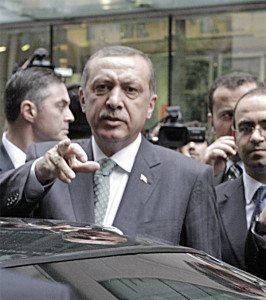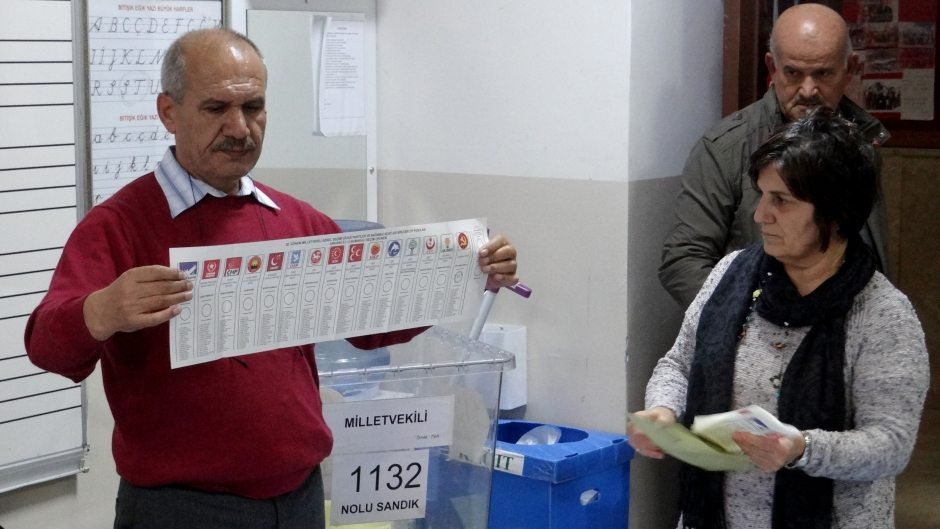Three Armenians Re-Elected to Parliament

ISTANBUL, Turkey (A.W.)—On Nov. 1, with about 49.4 percent of the votes in Sunday’s snap elections, Turkish President Recep Tayyip Erdogan’s ruling Justice and Development Party (AKP) regained its majority rule in parliament, according to the state-run Anadolu news agency. The AKP fell short of the super-majority that it sought to change the country’s constitution, thereby increasing Erdogan’s presidential powers. The AKP is now 14 seats shy of calling a constitutional referendum without the help of other parties.
The snap elections were called by Erdogan after the AKP failed to form a coalition government following the June parliamentary elections. On June 7, the party lost its 12-year majority rule largely because of the success of the Peace and Democracy Party (HDP) that broke the 10-percent barrier and received around 13 percent of the votes.
The AKP won 317 of the 550 seats in parliament in Sunday’s vote, significantly more than the 276 it needed to form a government and 59 more than it did during the June elections.
The HDP once again broke the 10-percent threshold needed to claim seats in parliament, but won 21 fewer seats than it did in the June elections.
The Nationalist Movement Party’s (MHP) share of the vote also dropped from about 16 percent to 11.9 percent, with 39 fewer members in the new parliament. The Republican People’s Party (CHP) gained three seats.
The three Armenians who were elected to parliament in the June elections—Garapet (Garo) Paylan, who ran on the HDP list; Markar Esayan from the ruling AKP; and Selina Ozuzun Dogan from the CHP—were re-elected on Nov. 1.
Shorty following the news of the AKP’s probable win, Kurdish youth began protesting in the streets of Diyarbakir; they were met with Turkish Police water cannons.
OSCE: Campaign Characterized by Unfairness and Fear
In a statement released following Sunday’s elections, the Organization for Security and Cooperation in Europe (OSCE), which coordinated a short-term observer mission during the elections, said that while election day was generally peaceful, and that voting was largely organized in an efficient manner in the limited number of polling stations observed, the ongoing tensions in the country and restrictions on media freedom greatly affected the campaigning process as well as the outcome.

“The challenging security environment, in particular in the southeast, coupled with a high number of violent incidents, including attacks against party members and campaign staff, as well as on party premises, hindered contestants’ ability to campaign freely. Media freedom remains an area of serious concern and the number of criminal investigations of journalists and the closure of some media outlets reduced voters’ access to a plurality of views and information. The 10-percent parliamentary threshold continues to limit political pluralism,” read the statement.
Ignacio Sanchez Amor (Spain) was appointed by the OSCE chairperson-in-office as special coordinator to lead the short-term observer mission; Margareta Cederfelt (Sweden) headed the OSCE PA delegation; Andreas Gross (Switzerland) headed the PACE delegation; while Ambassador Geert-Hinrich Ahrens acted as the head of the OSCE/ODIHR Limited Election Observation Mission (LEOM).
In a press conference, Amor said that widespread restrictions on media freedom remain a serious concern. “While Turkish citizens could choose between genuine and strong political alternatives in this highly polarized election, the rapidly diminishing choice of media outlets, and restrictions on freedom of expression in general, impacted the process and remain serious concerns… Physical attacks on party members, as well as the significant security concerns, particularly in the southeast, further imposed restrictions on the ability to campaign,” said Amor.
“Unfortunately, the campaign for these elections was characterized by unfairness and, to a serious degree, fear,” said Gross. “In light of this, it is even more vital that the president works for an inclusive political process to deal with the problems facing Turkey, ensuring that all voices, including those who lost these elections, are able to be heard.”
According to Cederfelt, the violence in the largely Kurdish-populated areas in southeast Turkey “had a significant impact on the elections.”
“The recent attacks and arrests of members and activists, predominantly from the HDP, are of concern, as they hindered their ability to campaign… For an election process to be truly democratic, candidates need to feel that they can campaign and voters need to feel that they can cast their ballots in a safe and secure environment,” she was quoted as saying in a statement released by the OSCE.


A really cool article on the subject in New York Times by Roger Cohen:
Erdogan’s Violent Victory
http://www.nytimes.com/2015/11/03/opinion/turkey-election-erdogans-violent-victory.html
“Turkey, long the best hope for a Middle Eastern Muslim democracy, has not yet disappeared entirely over the authoritarian brink, but it is close.”
Given Turkey’s sinking stature even in the eyes of its supporters, this would have been a great time to make our move. That is, had Armenia used the past 20+ years to become more democratic, more prosperous, and therefore more powerful. Had we instead not wasted this time on plundering the country and then covering it up with pseudo-nationalistic rhetoric, it would have been such a great moment.
There will still be such opportunities in the future. The question is if Armenia will finally be ready for them.